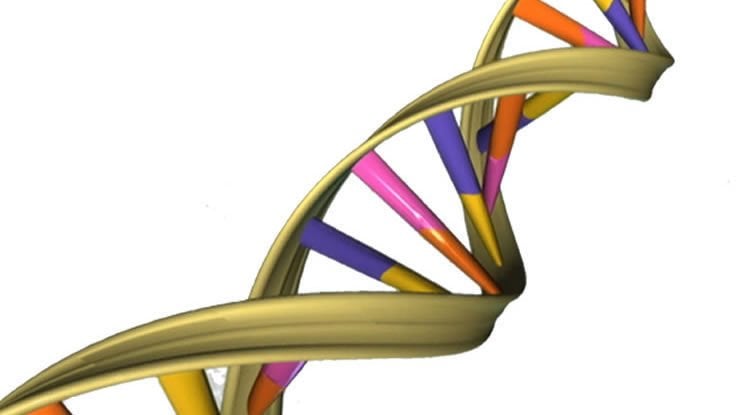Summary: Researchers have confirmed a link between a genetic mutation and major psychiatric disorders.
Source: University of Edinburgh.
Brain scans have revealed how a genetic mutation linked to major psychiatric disorders affects the structure, function and chemistry of the brain.
The study offers further clues about how the mutation increases the risk of schizophrenia, bipolar disorder and depression.
Experts say the findings could help in the quest for new treatments.
Researchers led by the University of Edinburgh scanned the brains of people that have a specific genetic mutation that causes part of one chromosome to swap places with another.
The mutation results in disruption of a gene called DISC1, which is associated with schizophrenia, bipolar disorder and recurrent major depression.
The team found that people with the genetic mutation had changes in the structure of their brain. These changes were linked with the severity of their symptoms of mental ill health.
They also showed that carriers of the mutation had lower levels of a chemical called glutamate in certain areas of their brain. Reduced glutamate levels have been strongly linked with schizophrenia in previous studies.
Researchers say their findings confirm that the DISC1 mutation is associated with a significantly increased risk of psychiatric illness.
They hope that continuing to study people with the mutation will reveal new insights to the biological mechanisms that underpin these conditions.

The DISC1 mutation was first identified in a Scottish family that showed unusually high rates of major psychiatric disorders. Scientists have been studying generations of the family for 40 years but this is the first time they have scanned their brains.
The study is published in the Nature partner journal Schizophrenia and was funded by the Translational Medicine Research Collaboration – a consortium of Scottish universities and NHS Health Boards, Scottish Enterprise and Pfizer.
Professor Stephen Lawrie, Head of the Division of Psychiatry at the University of Edinburgh, said: “This study confirms and extends the genetics of DISC1, and shows how that and similar genetic effects can increase the risk of major mental illnesses.”
Source: Jen Middleton – University of Edinburgh
Image Source: This NeuroscienceNews.com image is in the public domain.
Original Research: Full open access research for “Balanced translocation linked to psychiatric disorder, glutamate, and cortical structure/function” by Pippa A Thomson, Barbara Duff, Douglas H R Blackwood, Liana Romaniuk, Andrew Watson, Heather C Whalley, Xiang Li, Maria R Dauvermann, T William J Moorhead, Catherine Bois, Niamh M Ryan, Holly Redpath, Lynsey Hall, Stewart W Morris, Edwin J R van Beek, Neil Roberts, David J Porteous, David St. Clair, Brandon Whitcher, John Dunlop, Nicholas J Brandon, Zoë A Hughes, Jeremy Hall, Andrew McIntosh and Stephen M Lawrie in Schizophrenia. Published online August 10 2016 doi:10.1038/npjschz.2016.24
[cbtabs][cbtab title=”MLA”]University of Edinburgh. “Researchers Confirm Gene Mutation Link to Psychiatric Disorders.” NeuroscienceNews. NeuroscienceNews, 15 August 2016.
<https://neurosciencenews.com/genetics-psychiatry-disc1-4840/>.[/cbtab][cbtab title=”APA”]University of Edinburgh. (2016, August 15). Researchers Confirm Gene Mutation Link to Psychiatric Disorders. NeuroscienceNews. Retrieved August 15, 2016 from https://neurosciencenews.com/genetics-psychiatry-disc1-4840/[/cbtab][cbtab title=”Chicago”]University of Edinburgh. “Researchers Confirm Gene Mutation Link to Psychiatric Disorders.” https://neurosciencenews.com/genetics-psychiatry-disc1-4840/ (accessed August 15, 2016).[/cbtab][/cbtabs]
Abstract
Balanced translocation linked to psychiatric disorder, glutamate, and cortical structure/function
Rare genetic variants of large effect can help elucidate the pathophysiology of brain disorders. Here we expand the clinical and genetic analyses of a family with a (1;11)(q42;q14.3) translocation multiply affected by major psychiatric illness and test the effect of the translocation on the structure and function of prefrontal, and temporal brain regions. The translocation showed significant linkage (LOD score 6.1) with a clinical phenotype that included schizophrenia, schizoaffective disorder, bipolar disorder, and recurrent major depressive disorder. Translocation carriers showed reduced cortical thickness in the left temporal lobe, which correlated with general psychopathology and positive psychotic symptom severity. They showed reduced gyrification in prefrontal cortex, which correlated with general psychopathology severity. Translocation carriers also showed significantly increased activation in the caudate nucleus on increasing verbal working memory load, as well as statistically significant reductions in the right dorsolateral prefrontal cortex glutamate concentrations. These findings confirm that the t(1;11) translocation is associated with a significantly increased risk of major psychiatric disorder and suggest a general vulnerability to psychopathology through altered cortical structure and function, and decreased glutamate levels.
“Balanced translocation linked to psychiatric disorder, glutamate, and cortical structure/function” by Pippa A Thomson, Barbara Duff, Douglas H R Blackwood, Liana Romaniuk, Andrew Watson, Heather C Whalley, Xiang Li, Maria R Dauvermann, T William J Moorhead, Catherine Bois, Niamh M Ryan, Holly Redpath, Lynsey Hall, Stewart W Morris, Edwin J R van Beek, Neil Roberts, David J Porteous, David St. Clair, Brandon Whitcher, John Dunlop, Nicholas J Brandon, Zoë A Hughes, Jeremy Hall, Andrew McIntosh and Stephen M Lawrie in Schizophrenia. Published online August 10 2016 doi:10.1038/npjschz.2016.24






